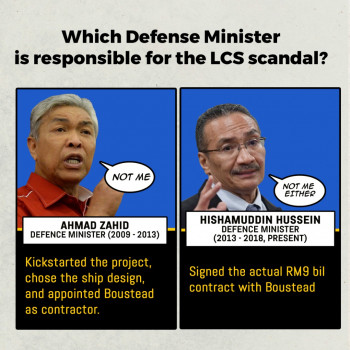by Liew Chin Tong
 Like his predecessor Tun Abdullah Ahmad Badawi, the ultimate challenge facing Prime Minister Datuk Seri Najib Razak is not an external one. It is internal. In fact, it is an issue of personality. He simply lacks conviction.
Like his predecessor Tun Abdullah Ahmad Badawi, the ultimate challenge facing Prime Minister Datuk Seri Najib Razak is not an external one. It is internal. In fact, it is an issue of personality. He simply lacks conviction.
A hundred foreign public relations firms doing a function similar to what the bright young advisers of Putrajaya’s fourth floor did during Pak Lah’s era won’t be able to solve the myriad of problems facing the prime minister.
Najib’s reform announcement on the eve of Malaysia Day has the potential to transform the country into a mature nation… something that Malaysians have been yearning for two decades.
His promises, among others, include putting an end to the various Emergency declarations, repealing the notorious Internal Security Act, and removing the annual licensing requirement for newspapers under the still very restrictive Printing Presses and Publications Act.
Since the beginning of discussions on Vision 2020 and “Melayu Baru” in the early 1990s, Malaysians of all backgrounds, Malays included, have been wanting Malaysia to be a normal democracy in which basic human rights are respected and due processes followed.
Anti-corruption and anti-cronyism, good governance, and fairer access to opportunities were the shared themes of the last three general elections (in 1999, 2004 and 2008) since the Asian economic crisis. This trend was highlighted all the more when Abdullah succeeded only by hijacking the reform platform in 2004.
While no one expected Tun Dr Mahathir Mohamad to reform the outdated institutions during his reign, many Malaysians, in particular Malays, tolerated his excesses in the 1990s as they hoped the then-
Deputy Prime Minister Datuk Seri Anwar Ibrahim would take over and liberate the system. But the future did not come and the past still refuses to go away.
Expectations for major institutional reform were particularly high after Abdullah assumed the premiership in October 2003, and stayed that way when Najib took over in April 2009.
Both Abdullah and Najib failed to deliver on the reforms they promised, and both had their credibility badly dented by their respective mishandling of the Bersih rallies of November 2007 and July 2011.
Najib effectively ended Abdullah’s tenure through meetings on September 17 and 26, 2008, citing the threat of Anwar’s September 16 claim and Abdullah’s diminishing popularity.
In the first instance, Abdullah conceded his much-coveted finance portfolio to Najib and, blood having been drawn, at the Umno supreme council meeting a week later, Abdullah was forced to hasten his retirement plan.
Ironically, Najib’s fate seems to be a repeat of his predecessor’s, especially after a Merdeka Center survey revealed on August 29, 2011 that his popularity had dived further south. Sensing that the knives may already have been drawn, Najib sought desperately for some way to steer his fate away from the same path that he forced Abdullah onto.
Dr Mahathir was already seen lurking in the background. Note that he had already scheduled himself to give a huge television interview on Malaysia Day. I strongly suspect that this was what prompted Najib to make his big announcement on the eve of the big day.
Both Abdullah and Najib began their premiership cognizant of the fact that their success would be determined by the extent to which they could reform the oldest elected government in the world that is still in office.
Yet, none of them wanted to be a Mikhail Gorbachev or a B.J. Habibie. Perhaps glasnost has a bad name.
Few knew that autocrats in Taiwan and South Korea conceded Emergency powers under pressure from democratic uprisings in 1987 but managed to delay regime change for more than a decade by competing in reasonably clean and democratic elections, with the huge financial and administrative resources that were at their disposal.
South Korea saw a complete break only in 1997 with the election of Kim Dae-Jung while Taiwan’s regime change happened only in 2000.
But as I said, both Najib and Abdullah lack conviction. Without conviction there is no coherent agenda, not to mention determination and imagination — these are leadership qualities that define most reformers.
Abdullah relied on the fourth-floor boys while Najib depends on one after another expensive foreign consultants. There is a strong tendency at all levels to mistake media advisers sitting in air-conditioned rooms for street-wise political strategists.
Top-level sophisticated strategists and operatives with stature among the Umno rank and file such as Daim Zainuddin, Sanusi Junid, Megat Junid and Aziz Samsudin or a propagandist like Mohamed Rahmat who were active during Dr Mahathir’s time have no equivalent within both Abdullah’s and Najib’s administrations.
The previously effective political machine of Umno which saw generations of brilliant political operatives at all levels from the top down to the village level has given way to a chase for contracts and nothing else.
Najib is now entering his “Pak Lah moment”, and unless he can reshape his game by at least changing his Cabinet, his future is already here for all to see. –The Rocket



